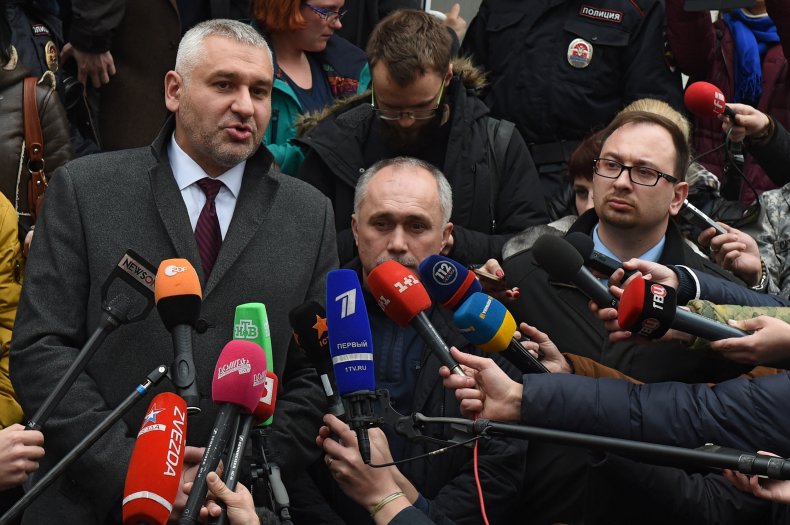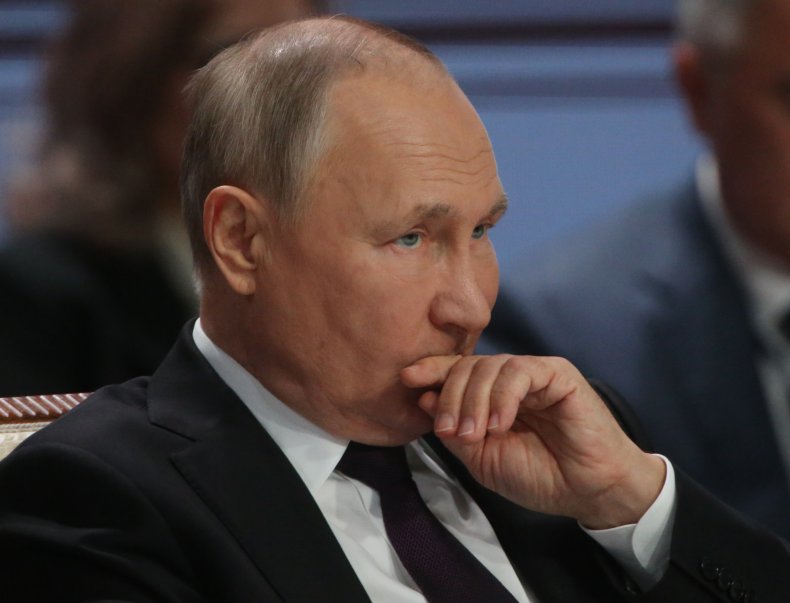DAVID BRENNAN
Russian President Vladimir Putin "doesn't control" the progress of his disastrous war in Ukraine, according to a former member of the Russian parliament now opposing the Kremlin from abroad as a prominent human rights lawyer.
Mark Feygin, a former deputy in the State Duma—the lower house of the Federal Assembly of Russia—told Newsweek that for the first time in his career, the Russian president has found himself in a military quagmire with no clear way out.
"This is the first time when his future is not defined by himself," said Feygin, a human rights lawyer who has represented high-profile defenders including the Pussy Riot punk band, and opposition aide Leonid Razvozzhayev, who was kidnapped from Kyiv in 2021 by Russian special forces.
The instability has left Putin more isolated and more afraid, Feygin said.
"He's entering the eighth decade of his life, and his psychological condition is not good. He is somewhat paranoid right now, and he sees or expects that his own inner circle, his own people, may rejoice to a certain degree that these failures are happening to him."
"He sees enemies everywhere, and his condition is not improving. He sees that it's a definite threat to his political future."
 Mark Feygin, lawyer of Ukrainian military pilot Nadiya Savchenko, speaks to the media outside a court in the southern Russian town of Donetsk, on March 22, 2016.VASILY MAXIMOV/AFP VIA GETTY IMAGES
Mark Feygin, lawyer of Ukrainian military pilot Nadiya Savchenko, speaks to the media outside a court in the southern Russian town of Donetsk, on March 22, 2016.VASILY MAXIMOV/AFP VIA GETTY IMAGESNewsweek has contacted the Russian Foreign Ministry to request comment.
Russia's wars in Chechnya, Georgia, Syria, and Ukraine in 2014 did not threaten Putin's position in the same way as this year's invasion—now approaching its eighth month—has, Feygin said.
"Whatever he does, he doesn't hold the eventuality of this war, he doesn't control how it will happen," he said.
Feygin—who since February has gained a large YouTube following thanks to daily video discussions with Ukrainian presidential advisor Oleksiy Arestovych—said the dictator bought into the expectation that Russia's armed forces would overwhelm the Ukrainian defenders in short order.
"He definitely wanted this war to be a two or three day affair," Feygin said. "He wanted it to be a blitzkrieg. His generals convinced him that it would be an easy operation." Since the humiliating collapse of Russia's northern axis of invasion in the spring, the Kremlin has been trying and failing to seize back momentum.
"Many times during this campaign, the goals of this war were changed," Feygin said. "He is also changing generals, he's changing his commanders on the fronts, he is changing dates...he now is frantically looking for new allies in Asia and the Middle East."
 Russian President Vladimir Putin is pictured during the plenary session of the Commonwealth of the Independent States Summit, on October 14, 2022 in Astana, Kazakhstan.
Russian President Vladimir Putin is pictured during the plenary session of the Commonwealth of the Independent States Summit, on October 14, 2022 in Astana, Kazakhstan."He is losing confidence and he doesn't know how to solve the problems that this war presents to him...each new defeat he takes personally."
Putin's recent escalations—his mobilization order, nuclear threats, missile and drone barrages, and claimed annexation of four partially-occupied Ukrainian regions—represent the strongman's attempts to seize back control of the spiraling situation, Feygin said.
"He is sure he needs to convince the West to let him have those four regions that he partly occupies," he said. "He gets the news from the front that is not peachy, he understands that mobilization will probably not help to improve that situation, it might even make it worse."
"He is, I would say, afraid to use nukes because he understands that that will cause a whole slew of other dire consequences that he doesn't want to bring upon himself. And that's why, probably, he's using channels like [Turkish President Recep Tayyip] Erdogan and others to try to communicate and push the West to help him find his way out of war."
There has been much speculation that a defeat for Russia in Ukraine will mean the end of Putin. Feygin suggested that even a limited Ukrainian victory may end Putin's 22 years in power.
"If Ukraine simply recaptures or keeps Putin's troops out of the four regions without even taking Crimea, that would already likely crash Putin's regime," Feygin said, referring the four Ukrainian territories—Donetsk, Luhansk, Kherson and Zaporizhia—that the Kremlin claims to have annexed.
"They don't know how to deal with defeat," he said of Putin and his top allies. "In all likelihood, it's not possible that Putin will survive that kind of defeat, neither politically nor personally."
No comments:
Post a Comment